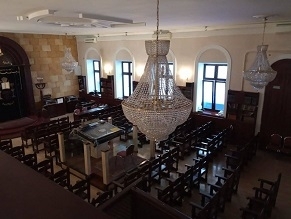|
Analytics

Empty synagogue of Odessa. Photo by Boleslav Kapulkin.
|
Jewish Life in FSU: an Overview (March 2020)
24.04.2020, Communities of Eurasia In March, as well as on the whole planet, Jewish community was affected by the epidemic of the COVID-19 virus. The reaction of the Jewish community as a whole corresponded to the official line of governments, scientific and medical institutions. Starting from Purim, most of concerts, celebrations, seminars and conferences have been cancelled. By mid-March, in accordance with the recommendations, almost all community-based institutions, places of worship, cultural and educational institutions headed were colsed. Charity projects, especially those aimed at older people, continued to work, but now specially equipped volunteer teams began to bring the help to homes. Educational and cultural institutions, as far as possible, have switched to online mode.
Community life
● In the second half of March, the rabbi of the Moscow Bronnaya synagogue Yitzhak Kogan, 73, was hospitalized in serious condition with a coronovirus infection. COVID-19 was also diagnosed in his wife.
Presumably, r.Kogan has contacted with an infected Israeli rabbi during the Purim celebration in the synagogue. The rabbi from Israel was hospitalized also.
For more than ten years during Soviet times, Yitzhak Kogan was a “refusenik”. The authorities did not allow him to make aliyah (repatriation to Israel), since he worked as an engineer at a defense enterprise. Being fired, he made a living repairing refrigerators. His apartment in Leningrad became one of the centers of the informal Jewish religious movement. In 1988, he finally got the opportunity to emigrate to Israel. In 1991, with the blessing of the Lubavitcher Rebbe Menachem Mendel Schneerson, he returned to Russia, and since then he headed the community of the Moscow synagogue on Bolshaya Bronnaya street.
Already on April 1, it became known that r. Kogan and his wife have recovered.
During this March, many community-based social and charitable projects reoriented in light of the epidemic.
● In Ukraine, the Jewish Community Hotline “910”, founded by the United Jewish Community of Ukraine, which had previously received reports of anti-Semitism, began to work as an information service about the epidemic.
The United Jewish Community of Ukraine has initiated the sewing of protective masks also. (
● The Jewish Community of city of Dnipro opened a hotline on medical issues.
● The Jewish community of Estonia has created an anti-crisis headquarters. First of all, its goal is to organize contactless assistance to the elderly and those in need of support.
● In Kyiv, the Chabad-Lubavitch community organized a help center, primarily for older people who need food or medicine.
● Closed to visitors, the Moscow Jewish Museum and Tolerance Center has opened an access to the online version of the exposition.
● The Jewish Museum of Odessa has organized a virtual tour of the exposition also.
To continue an educational activity, many projects were transferred to the online mode also.
● So, the lecture course on Jewish art by Valery Dymshits, director of the St. Petersburg Jewish Studies Center at the European University in St. Petersburg, switched to online mode.
● Migdal Odessa Community Center launched a program of daily video lessons for children and adults.
●The international Aleph-Bet: Zionism Сonference scheduled for March 15 in Kyiv, timed to coincide with the election of delegates from the Jewish community of Ukraine to the 38th World Zionist Congress, was canceled. Part of the conference reports were read online.
The Jewish community of Ukraine is the second in the world after the American one, where democratic elections of delegates to the Zionist Congress are held, not a formal distribution of mandates. In 2020, in Ukraine, the election of delegates was to be held for the second time, but has been postponed because of the epidemic.
Extraordinary accidents
● On March 13, in Dagestan city of Buinaksk (Russia, the North Caucasus), the chairman of the city Jewish community, the rabbi of the local synagogue Izhiyahu Pashayev was severely beaten by a 34-year-old local resident. On March 18, the rabbi died of injuries in the intensive care hospital ward.
As far as one can judge from the available information, the incident was not motivated by the anti-Semitism. Rather, it is a matter of domestic conflict, which may conceal domestic violence. According to the rabbi’s neighbors, he sheltered a woman in his house who had nowhere to live, and the man who has beat Pashayev was her brother.
Manifestations of Anti-Semitism
● On March 4, an anonymous email with (dis)information about the mining of synagogue buildings was received by the Ukrainian National Police, and police departments in several regions as well. It is known about reports of explosives planted in synagogues in Kiev, Vinnitsa, Zhytomyr, Ivano-Frankivsk, Mykolaiv, Odessa, Sumy, Kharkiv.
Police officers, bomb technicians and representatives of other rescue services arrived at all synagogue addresses. Explosives were not found anywhere.
Holocaust Remembrance
● Despite quarantine measures, a few symbolic ceremonies commemorating Holocaust victims took place on memorable dates. So, in Rohatin (Ivano-Frankivsk oblast’, Ukraine) on March 20, public events were canceled, but their initiators came to the memorial at the site of the mass execution of Jews by the Nazis and read a memorial prayer.
See also:
By Vyacheslav Likhachev for UCSJ
|
|
